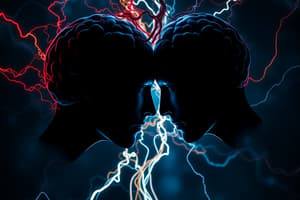Podcast
Questions and Answers
What are the objectives of this session?
What are the objectives of this session?
- To understand the concept of CHECAR
- To learn about the psychology of learning and its importance
- To gain a general idea of the course, understand course rubrics, and refresh memories on last semester's lectures (correct)
- To understand the concept of killing the notion of me and I
What is the topic of this session?
What is the topic of this session?
- Human Behavior
- The Psychology of Teaching
- The Psychology of Learning (correct)
- Killing the Notion of Me and I
Why are psychologists and scholars interested in how humans learn?
Why are psychologists and scholars interested in how humans learn?
- To learn about animal behavior
- To influence human behavior
- To understand and influence behavior (correct)
- To understand human behavior
What is still a challenge in the field of learning?
What is still a challenge in the field of learning?
According to Hall (2003), what is learning?
According to Hall (2003), what is learning?
What is the recommended reading for this session?
What is the recommended reading for this session?
What is the title of this course?
What is the title of this course?
What academic year is this course being offered?
What academic year is this course being offered?
What is the key issue in Classical Conditioning?
What is the key issue in Classical Conditioning?
What is the name of the type of learning that involves the acquisition of physical skills?
What is the name of the type of learning that involves the acquisition of physical skills?
What is the process by which the association between the conditioned stimulus and the unconditioned stimulus is eliminated?
What is the process by which the association between the conditioned stimulus and the unconditioned stimulus is eliminated?
What is the domain of learning that involves the acquisition of attitudes, values, and feelings?
What is the domain of learning that involves the acquisition of attitudes, values, and feelings?
Who accidentally discovered Classical Conditioning?
Who accidentally discovered Classical Conditioning?
What is the unconditioned response in Classical Conditioning?
What is the unconditioned response in Classical Conditioning?
What is the effect of spontaneous recovery in classical conditioning?
What is the effect of spontaneous recovery in classical conditioning?
What is the name of the type of learning where the organism is instrumental in the learning process?
What is the name of the type of learning where the organism is instrumental in the learning process?
What is the purpose of the neutral stimulus in Classical Conditioning?
What is the purpose of the neutral stimulus in Classical Conditioning?
What is an example of a practical life situation where classical conditioning is applied?
What is an example of a practical life situation where classical conditioning is applied?
What is the outcome of learning through Classical Conditioning?
What is the outcome of learning through Classical Conditioning?
What is the term for treating alcohol/drug addiction using classical conditioning?
What is the term for treating alcohol/drug addiction using classical conditioning?
What type of learning is involved in scratch and win promotions and lotteries?
What type of learning is involved in scratch and win promotions and lotteries?
What are the two Greek words that make up the term psychology?
What are the two Greek words that make up the term psychology?
From which two disciplines did psychology emerge?
From which two disciplines did psychology emerge?
What was the initial definition of psychology?
What was the initial definition of psychology?
What can contribute to a person feeling de-valued or demeaned?
What can contribute to a person feeling de-valued or demeaned?
Who can make us feel worthless with their negative comments or actions?
Who can make us feel worthless with their negative comments or actions?
What can reduce a person's sense of worth in a domestic setting?
What can reduce a person's sense of worth in a domestic setting?
What is an example of prejudice?
What is an example of prejudice?
What can occur when a person's emotional needs are ignored or not responded to?
What can occur when a person's emotional needs are ignored or not responded to?
Who may experience emotional neglect?
Who may experience emotional neglect?
What can influence how a person values themselves relative to others?
What can influence how a person values themselves relative to others?
What can cause a person to feel worthless?
What can cause a person to feel worthless?
What is one of the ways that memory helps individuals?
What is one of the ways that memory helps individuals?
Who is credited with starting experimental studies of human memory?
Who is credited with starting experimental studies of human memory?
What type of combinations did Herman Ebbinghaus use to test his memory?
What type of combinations did Herman Ebbinghaus use to test his memory?
What is the name of the model proposed by Atkinson and Shiffrin in 1968?
What is the name of the model proposed by Atkinson and Shiffrin in 1968?
What is the process of converting sensory information into a form that can be entered into memory?
What is the process of converting sensory information into a form that can be entered into memory?
What is the primary focus of the Information Processing Model of memory?
What is the primary focus of the Information Processing Model of memory?
Why are psychologists interested in studying human memory?
Why are psychologists interested in studying human memory?
What is the primary conclusion that Herman Ebbinghaus drew from his experiments?
What is the primary conclusion that Herman Ebbinghaus drew from his experiments?
Flashcards are hidden until you start studying
Study Notes
Session Objectives
- Gain a general idea of what the course is about
- Understand course rubrics and expectations of students and lecturers
- Refresh memories on last semester's lectures
- Briefly describe topics for this semester
Session Readings
- Course textbook Chapter 6
The Psychology of Learning
- For centuries, psychologists and scholars have been interested in how humans and other organisms learn
- This interest ties in with our quest to understand and influence behavior
- There continues to be challenges in establishing a single, universally accepted definition of learning
- Hall (2003) defines learning as the process by which an animal (human or non-human) interacts with its environment and becomes changed by this experience so that its subsequent behavior is modified
- Learning helps us adapt to our environment and improve our wellbeing
- Effective social interaction, emotional maturity, etc., are also acquired through one or a combination of the various types of learning
Domains of Learning
- Learning can occur in different domains/aspects of the individual's life
- Psychomotor domain: acquisition of physical skills like walking, talking, etc.
- Cognitive domain: ability to acquire, retain, and organize information to solve problems
- Affective domain: acquisition of attitudes, values, feelings, etc.
Types of Learning
- Classical Conditioning (CC): type of learning discovered by Pavlov (1927) while studying gastric secretion/digestion in dogs
- CC involves the formation of an association between/among stimuli which originally/initially may have nothing in common
- Learning occurs through a stimulus-response mechanism when an organism learns to respond to a stimulus in a particular way after that stimulus has been paired with another one over a period of time
- Extinction: occurs when the CS is continuously presented (after the association) without the UCS, weakening the association between the CS and the UCS
- Spontaneous recovery: the re-ignition of the association between the CS and the UCS after extinction
Operant Conditioning
- This is a neo-Behaviorist theory of learning in organisms
- It argues that the organism/individual is not a passive recipient of stimulus-response processes but rather actively engages with the environment before learning occurs
- The individual's behavior is governed by the anticipated consequences rather than automatic response elicited by a stimulus
- Raffles and Draws are often based on operant conditioning
Factors Leading to Low Self-Esteem
- Poor physical health: illness, injury, deformity, and other physical health problems can make a person feel de-valued or demeaned
- Negative comments/actions of other people: other people's treatment of us and feedback concerning e.g. our looks, actions, etc. can make us feel worthless
- Domestic violence: violent/aggressive/abusive behavior including emotional abuse at home with a family or co-habitant can significantly reduce a person's sense of worth
- Prejudice and negative stereotyping: prejudice refers to prejudgments of persons or situations that are based on their membership of a group and can be harmful
- Emotional neglect: it occurs when a person, especially children's emotional needs are ignored or not responded to appropriately
Memory
- Importance of memory: memory helps to remember the past, retain new information, solve problems, plan for the future, build and maintain relationships, etc.
- Experimental studies of human memory were started by German psychologist Herman Ebbinghaus (1850-1909)
- He used a set of nonsense syllables (meaningless 3-letter combinations) to test how well he could remember things
- He realized it was easy to forget things as quickly as they are learnt
- The Information Processing Model (Atkinson & Shiffrin, 1968) views memory as a systematic movement of information from one storage system to another
Studying That Suits You
Use AI to generate personalized quizzes and flashcards to suit your learning preferences.




